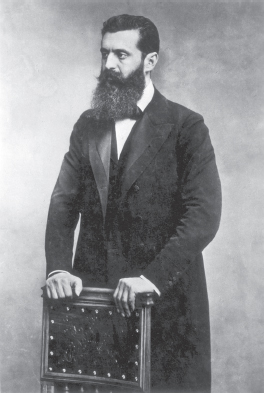Understanding Western Society
Printed Page 733
Chapter Chronology
INDIVIDUALS IN SOCIETY
Theodor Herzl

Theodor Herzl. (The Granger Collection, New York.)
In September 1897, only days after his vision and energy had called into being the First Zionist Congress in Basel, Switzerland, Theodor Herzl (1860–1904) assessed the results in his diary: “If I were to sum up the Congress in a word — which I shall take care not to publish — it would be this: At Basel I founded the Jewish state. If I said this out loud today I would be greeted by universal laughter. In five years perhaps, and certainly in fifty years, everyone will perceive it.”* Herzl’s buoyant optimism, which so often carried him forward, was prophetic. Leading the Zionist movement until his death at age forty-four in 1904, Herzl guided the first historic steps toward modern Jewish political nationhood and the creation of Israel in 1948.
Theodor Herzl was born in Budapest, Hungary, into an upper-middle-class, German-speaking Jewish family. When he was eighteen, his family moved to Vienna, where he studied law. As a university student, he soaked up the liberal beliefs of most well-to-do Viennese Jews, which included assimilation of German culture. Wrestling with his nonreligious Jewishness and his strong pro-German feeling, Herzl embraced German nationalism and joined a German dueling fraternity. There he discovered that full acceptance required openly anti-Semitic attitudes and a repudiation of all things Jewish. Herzl resigned.
After receiving his law degree, Herzl embarked on a literary career. In 1889, he married into a wealthy Viennese Jewish family, but he and his socialite wife were mismatched and never happy together. Herzl achieved considerable success as both a journalist and a playwright. His witty comedies focused on the bourgeoisie, including Jewish millionaires trying to live like aristocrats. Accepting many German stereotypes, Herzl sometimes depicted eastern Jews as uneducated and grasping. But he believed that the Jewish shortcomings he perceived were the results of age-old persecution and would disappear through education and assimilation. Herzl also took a growing pride in Jewish steadfastness in the face of victimization and suffering.
The emergence of modern anti-Semitism shocked Herzl, as it did many acculturated Jewish Germans. Moving to Paris in 1891 as the correspondent for Vienna’s leading liberal newspaper, Herzl studied contemporary politics and pondered recent historical developments. He came to a bold conclusion, published in 1896 as The Jewish State: An Attempt at a Modern Solution to the Jewish Question. According to Herzl, Jewish assimilation had failed, and attempts to combat anti-Semitism would never succeed. Only by building an independent Jewish state could the Jewish people flourish.
Herzl developed his Zionism before the anti-Jewish agitation accompanying the Dreyfus affair, which only served to strengthen his faith in his analysis. Generally rebuffed by skeptical Jewish elites in western and central Europe, Herzl turned for support to youthful idealists and the poor Jewish masses. He became an inspiring man of action, rallying the delegates to the annual Zionist congresses, directing the growth of the worldwide Zionist organization, and working himself to death. Herzl also understood that national consciousness required powerful emotions and symbols, such as a Jewish flag. Flags build nations, he said, because people “live and die for a flag.”
Putting the Zionist vision before non-Jews and world public opinion, Herzl believed in international diplomacy and political agreements. He traveled constantly to negotiate with European rulers and top officials, seeking their support in securing territory for a Jewish state, usually suggesting that it take form in Palestine, a territory in the Ottoman Empire. Aptly described by an admiring contemporary as “the first Jewish statesman since the destruction of Jerusalem,” Herzl proved most successful in Britain. His work paved the way for the 1917 Balfour Declaration, which solemnly pledged British support for a “Jewish homeland” in Palestine.
*Quotes are from Theodor Herzl, The Diaries of Theodor Herzl, trans. and ed. with an introduction by Marvin Lowenthal (New York: Grosset & Dunlap, 1962), pp. 224, 22, xxi.
- Describe Theodor Herzl’s background and early beliefs. Do you see a link between Herzl’s early German nationalism and his later Zionism?
- Why did Herzl believe an independent Jewish state with its own national flag was necessary?
- How did Herzl work as a leader to turn his Zionist vision into a reality?
What role did popular nationalism play in the emergence of modern anti-Semitism, and how did Herzl respond to the virulent anti-Semitism of this period? Examine examples of anti-Semitic nationalist writings and Herzl’s argument for the creation of a Jewish state, and then complete a writing assignment based on the evidence and details from this chapter.
See Document Project for Chapter 23.

